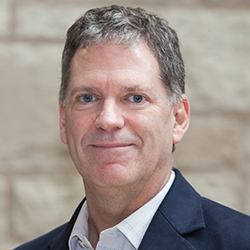National Science Foundation Award Paves Way for New Center for Pandemic Decision Science
A multi-institutional research team will tackle how to prepare the world to combat future pandemic threats
Northwestern Engineering’s David Morton is a member of the new multi-institutional UT Center for Pandemic Decision Science (CPDS). Led by University of Texas at Austin (UT) and supported by a National Science Foundation pilot grant, the new interdisciplinary center will bring together scientists, engineers, clinicians, and policymakers to tackle the grand challenge of preparing the world to combat future pandemic threats.
“This represents an ambitious next step for the UT COVID-19 Modeling Consortium,” said Lauren Ancel Meyers, a professor of integrative biology and statistics and data sciences at UT who is directing the effort. “Over the last three years, the consortium has been a leading force in pandemic forecasting to help individuals, schools, communities and global leaders navigate the changing risks of the virus.”

“This grant is an opportunity to advance the science of data-driven decision making in public health,” said Morton, David A. and Karen Richards Sachs Professor of Industrial Engineering and Management Sciences and chair of the industrial engineering department at the McCormick School of Engineering. “If successful, we will be better positioned to inform policy in future pandemics. Success will hinge on collaborating with epidemiologists, computer scientists, behavioral psychologists, and importantly, policy makers in government.”
The new center will tackle three fundamental challenges that plagued the global response to COVID-19 and are critical to the future resilience of our planet:
- Anticipating novel pathogen threats and detecting them at their source.
- Forecasting and positively influencing individual, collective, and governmental responses to pathogen
- Integrating science into every stage of pandemic decision-making, including prevention, detection, containment, and mitigation.
“COVID-19 revealed a fundamental failure of imagination,” Meyers said. “Leading into 2020, we assumed that the next pandemic would resemble those we have seen in the past. But COVID-19 was different. The international playbook did not include face masks, mass testing, or stay-at-home orders. It did not plan for misinformation campaigns, devastating racial disparities, years of lost education, or breakneck viral evolution.”
There are more than 40 multidisciplinary investigators from 11 institutions collaborating to establish the new CPDS. During the next 18 months, the center will host five workshops and conduct five pilot projects, including a hackathon to forecast human health behaviors and a pathogen “wargame” exercise for Texas public agencies.
These activities are designed to “build a road map for closing fundamental gaps in our understanding of pandemics,” Meyers said.
UT is the coordinating institution for the $1 million PIPP Phase I grant. Joining Meyers in project leadership from UT are Radu Marculescu, professor of electrical and computer engineering, Risto Miikkulainen, professor of computer science, and Claus Wilke, department chair of integrative biology. Morton is an external project leader, along with Mark Escott, City of Austin chief medical officer; Akihiro Nishi, assistant professor of epidemiology at the UCLA Fielding School of Public Health; and Holly Wichman, director for the Institute for Modeling Collaboration and Innovation at the University of Idaho. CPDS will also collaborate closely with the Santa Fe Institute and the Center for Advanced Pathogen Threat and Response Simulation.
Read More
In 2021, Morton collaborated as part of the UT COVID-19 Modeling Consortium to develop a monitoring system that tracks the number of new daily COVID-19 hospital admissions and triggers changes in guidance when admissions cross specific threshold values.